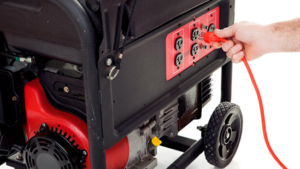
Test your emergency generator regularly to make sure it’s working when you need it.
Winter storms are inevitable in many parts of the country. Having a winter emergency plan in place can help your business and family cope and communicate when the storms hit.
FOR BUSINESS OWNERS
- Ensure that an emergency power supply is readily available and in service. Test your generator each month and verify it functions appropriately.
- Maintain adequate fuel supply for building heat and emergency generators. Make certain that fuel is properly stabilized and protected from moisture intrusion.
- Establish a severe winter weather team with written procedures to monitor conditions and alert management and maintenance personnel.
- List emergency phone numbers in your emergency plan, and post the list at all telephones. Ensure that all employees have these emergency phone numbers at home, on their mobile phones or somewhere off-site and that they are updated whenever the numbers change.
- Provide battery-operated and weather-alert radios in constantly staffed locations to monitor weather reports.
- Use weather applications on your smartphone to keep informed of severe weather events.
- Update your emergency plan to reflect changes in operations, facilities or personnel.
- Provide adequate emergency and first-aid supplies.
FOR YOUR FAMILY (as recommended on Ready.gov)
- Before winter approaches, add the following supplies to your emergency kit:
- Rock salt or more environmentally safe products to melt ice on walkways.
- Sand to improve traction.
- Snow shovels and other snow removal equipment.
- Sufficient heating fuel, taking all necessary safety precautions for storage. You may become isolated in your home and regular fuel sources may be cut off. Store a good supply of dry, seasoned wood for your fireplace or wood-burning heating equipment.
- Adequate clothing and blankets to keep you warm.
- Make a Family Communications Plan. Your family may not be together when disaster strikes, so it is important to know how you will contact one another, how you will get back together and what you will do in case of an emergency.
- A NOAA Weather Radio broadcasts alerts and warnings directly from the National Weather Service for all hazards. You may also sign up in advance to receive text notifications from your local emergency services.
- Free smartphone apps, such as those available from the Federal Emergency Management Agency and the American Red Cross, provide information about finding shelters, providing first aid and seeking assistance for recovery.
- Minimize travel. If travel is necessary, keep a disaster supplies kit in your vehicle.
- Bring pets/companion animals inside during winter weather. Move other animals or livestock to sheltered areas with unfrozen drinking water.
- The Centers for Disease Control and Prevention has a complete guide to Extreme Cold.
This loss control information is advisory only. The author assumes no responsibility for management or control of loss control activities. Not all exposures are identified in this article.
